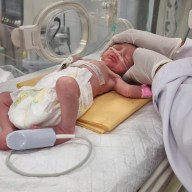 Venezuelan President Hugo Chavez delivers a speech upon landing at the airport in Tachira, Venezuela, on October 20, 2011.
Venezuelan President Hugo Chavez delivers a speech upon landing at the airport in Tachira, Venezuela, on October 20, 2011.
Credit:LEO RAMIREZ/AFP/Getty Images
“Hot spiders for old women with no teeth! Tasty spiders, for good-looking girls.” Fifty years later, the small couplets sang by Hugo Chavez in Sabaneta are only preserved in the memory of his fellow companions. Instead, the work of the “eternal commander” is a pride exhibited by most of his hometown (81 percent voted for him in last October’s presidential elections).
Times have changed. Nobody sells papaya sweets as tasty as those of grandmother Rosa Inés. In Simón Bolívar Square in Sabaneta there is now coffee, phone calls and trinket stalls. Only Jesus Castaño maintains the traditional “guarapo” (sweet drink) made from sugar cane. One glass costs $1.20. “It’s gives me enough to live,” he smiles.
From his privileged vantage point, Castaño witnessed two weeks of grief and mourning in Sabaneta when the “unexpected” news on March 5 was made known. One month later, he has very clear ideas: “Chavez has to come back, this is his land.”
The rumor comes from Castaño and extends throughout the town. Unanimity is total. “When I die I want you to take me there, to the town that is Sabaneta in Barinas state. And I’ll settle for something very simple, like grandma Rosa Inés,” reads a passage from “Cuentos del Arañero” (Tales of the Warbler), a compilation of stories about Chávez’s life.
The testament of death is known and defended by the people. At his childhood home, between the trees “Revolution” and “Rebellion” planted by Chávez and Bolivian President Evo Morales on a previous visit, there remains a giant mango tree, elected by the commander to shade his grave. “The vast majority wants him to be buried here. He requested it,” said Juan Chacon, cultural director of the municipality that regents Anibal Chávez, one of Chavez’s brothers. “But we understand that the decision is not ours, he belongs to Venezuela and Latin America. The decision that will be taken will be respected,” he added.
Chacon’s diplomacy seems necessary given the twists and turns of interim president Nicolás Maduro with the body of their leader. Maduro first announced to the world that he would be embalmed like Lenin and Mao, and then backtracked due to the state of decomposition of the body. The leaders of the PSUV (Chavez’s political party) proposed to hold a referendum to change the constitution so that the body could be taken to the Mausoleum of Simón Bolívar. A stalled initiative. For now, Chavez’s remains lie in a refrigerated coffin in Cuartel de la Montaña Harrison in his beloved 23 de Enero neighborhood in Caracas, where every day it’s visited by a thousand supporters.
“Bring el Comandante to Sabaneta,” cries Gilberto Castillo, a music CD seller standing a few meters from Simón Bolívar Square. “Our belief is that he will be buried here, he has to rest here,” he says as he shows this reporter the last hit of the revolutionary music. He turns on the player and the speakers blast out: “Commander Chávez died, the Robin Hood of the poor, the homeless, the Indians … No vices or shenanigans … The King of the XXI Century left. Revolution and loyalty, socialism forever.”
















